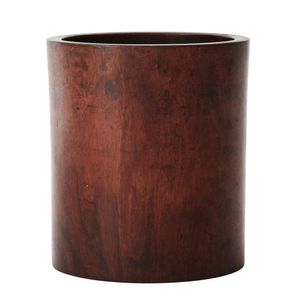17th Century Chinese Huanghuali Brushpot
A Chinese Huanghuali brushpot, Ming/Qing Dynasty, circa 17th century, of slightly waisted cylindrical form exhibiting a wide variety of different grain Formations, with a fine old patina. Height 15 cm, diameter 14 cm. Provenance: The Estate of William H Blakemore, Sydney
You must be a subscriber, and be logged in to view price and dealer details.
Subscribe Now to view actual auction price for this item
When you subscribe, you have the option of setting the currency in which to display prices to $Au, $US, $NZ or Stg.
This item has been sold, and the description, image and price are for reference purposes only.
- Ming Dynasty - The Ming Dynasty was a ruling dynasty of China from 1368 to 1644. It succeeded the Yuan Dynasty and preceded the Qing Dynasty. The Ming Dynasty was established by Zhu Yuanzhang, a former Buddhist monk who became a rebel leader and eventually overthrew the Mongol Yuan Dynasty. During the Ming Dynasty, China experienced a period of relative stability and prosperity. The government was centralized and bureaucratic, with the emperor at the top of the hierarchy. The Ming Dynasty is known for its cultural achievements, including the development of porcelain, the invention of movable type printing, and the construction of the Great Wall of China.
- Huanghuali Wood - Huanghuali is the most sought-after timber used in the construction of Chinese furniture because of its fine colour and grain.
During Ming and early Qing dynasties, most of the best furniture was made from huanghuali wood.
It is a member of the rosewood family and over time the surface mellows to a yellowish brown tone with the exposure to light.
In recent years, furniture made from huanghuali wood has increased exponentially in value. - Patination / Patina - In broad terms, patination refers to the exterior surface appearance of the timber, the effect of fading caused by exposure to sunlight and air over the course of a century or more, changing the piece to a soft, mellow colour.
As patina is very difficult to replicate, it is one of the most important guides to determining the age of furniture.
Patina is also the term applied to the bloom or film found on old bronzes due to oxidisation. - Circa - A Latin term meaning 'about', often used in the antique trade to give an approximate date for the piece, usually considered to be five years on either side of the circa year. Thus, circa 1900 means the piece was made about 1900, probably between 1895 and 1905. The expression is sometimes abbreviated to c.1900.
This item has been included into following indexes:
